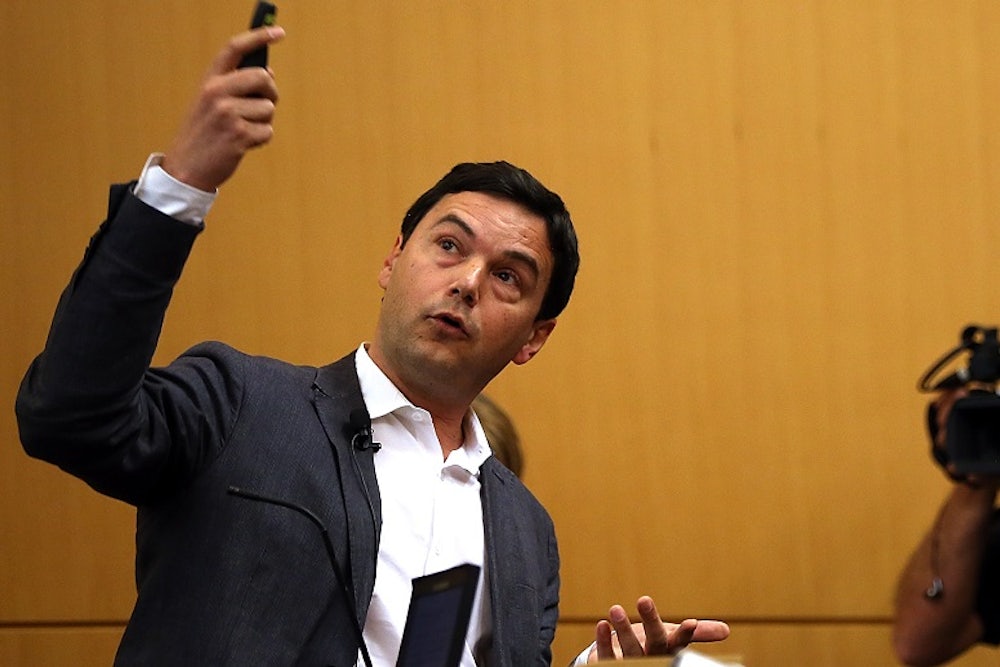Thomas Piketty’s Capital in the Twenty First Century has been praised across the ideological spectrum for its extensive database of income statistics and economic theory. But his policy proposal—a global tax on wealth—has no chance of happening.
Why describe such a serious problem and then offer such an un-serious solution? If Piketty’s conclusion is correct, than the United States must look for politically realistic ideas, not “utopian” ones, as Piketty describes his global wealth tax. Here are five achievable ideas with support in both parties:

1. Supplement wages for low-income workers
Few policy ideas have received such bipartisan support in recent months as expanding the Earned Income Tax Credit (EITC). The EITC increases the wages of low-income workers. In 2012, it lifted 6.5 million people out of poverty, but under the current system, childless workers can barely collect any EITC benefits.
Policymakers from both sides of the aisle—including President Barack Obama and Senators Patty Murray and Marco Rubio—have offered proposals to close that hole, but disagree on who should pay for the increase. Expanding the EITC under President Obama ‘s plan, for instance, would lift 500,000 people out of poverty and help another 10.5 million people, according to the Treasury Department. That’s minor compared to Piketty’s wealth tax, but would help many people nonetheless.

2. Progressive tax reform
The U.S. tax system is very progressive as is—particularly federal income taxes. But payroll taxes are still sharply regressive, as are many state and local taxes. High-income households also predominantly benefit from tax expenditures such as the mortgage-interest deduction, the deduction for employer-sponsored health insurance and various deductions for retirement accounts.
There are mean ways that we could make the tax system more progressive, including raising tax rates on the rich, implementing a financial transactions tax, replacing payroll taxes or curbing some of those tax expenditures. Some of these ideas, such as raising marginal tax rates on the rich, are less politically realistic. But Republican Congressman Dave Camp’s tax plan included a bank tax while also taxing capital gains income as ordinary income. These two ideas would reduce the after-tax earnings of executives and finance professionals. In response, Wall Street mobilized quickly and effectively against the proposal, but the ideas now have bipartisan support thanks to Camp’s plan. Indeed, the Joint Committee on Taxation projected that households with incomes between $200,000 and $1 million would pay a slightly higher tax rate. (Those with incomes over $1 million would see a slight cut.)

3. Make housing cheaper through deregulation
For most households, one of their biggest monthly expenses is housing, whether in the form of mortgage payments or rent. This is a policy choice. Through tight zoning laws, state and local regulations constrain the supply of housing. This drives up prices and allows landlords to extract rents from households and businesses. Deregulating the housing industry, particularly in gentrifying places like New York City, Washington D.C., and San Francisco, would create a construction boom to help the economy and allow millions of people to live cheaply in areas they desire. Upzoning would not happen via congressional action, but through state and local governments across the country.

4. Keep unemployment low to maintain worker bargaining power
The last time the majority of Americans saw significant wage growth was during the late 1990s when the labor market was tight and the unemployment rate briefly dipped below four percent. The limited supply of labor gave workers bargaining power to demand higher wages.
We are a long ways from full employment now and there is little political support for further action to move us closer in that direction. But we will get there, whether in 2015, 2016 or afterwards. When that happens, it’s important that the government does everything it can to keeps us there. That means properly regulating the financial industry. The Federal Reserve must fulfill its dual mandate of full employment and steady inflation. It means making smart infrastructure investments to allow for robust economic growth. Far too often, the government fails to do so—even when the economy is not in a recession as we saw during the mid-2000s. When that happens, workers lose their bargaining power, wages stagnate and inequality grows.

5. Deregulate copyright and patent law
Like strict zoning laws, the current intellectual property law regime is constructed to allow copyright, patent and trademark owners to extract rent from the economy without providing any productive benefit. The federal government created this property law regime. It determines what intellectual property qualifies for protection, how long the protection lasts and what the penalties are for breaking it. The stronger intellectual property law, the more benefits accrue to capital owners and the less to the rest of society. Intellectual property law must strike the proper balance between the public’s benefit while incentivizing innovators to invest resources and time creating music or searching for a new drug, for instance.
The past few decades have seen a consistent trend towards a stronger property law regime, thanks to intense lobbying from interest groups. This has resulted in huge profits for the pharmaceutical industry, for instance. Weakening intellectual property law would allow consumers to capture economic benefit that currently accrues to capital owners. Academics on both sides of the aisle support reduced IP protection, but policymakers face intense pressure from interest groups to extend current protections.
